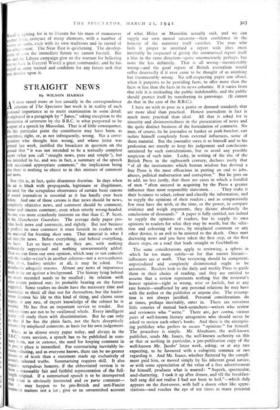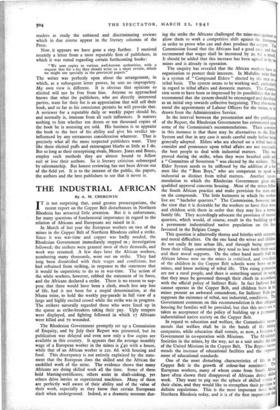STRAIGHT NEWS
By WILSON HARRIS
ts1 issue raised more or less casually in the correspondence columns of The Spectator last week is in reality of such °found importance as to merit examination in some detail. t originated in a paragraph by " Janus," taking exception to the terjection of comment by the B.B.C. in what purported to be report of a speech by Mussolini. That is of little- consequence.
this particular point the contributor may have been, as ometimes, right, or, as not infrequently, wrong. But a corre- pondent who thought him wrong, and whose letter was rinted last week, justified the broadcast in question on the ound that " it was not intended to be a textually complete eport (what you call ' straight news, pure and simple '), but 'as intended to be, and was in fact, a summary of the speech 'ith occasional appropriate comment," the implication being there is nothing to object to in this mixture of comment news.
Now this is, in fact, quite disastrous doctrine. In days when air is black with propaganda, legitimate or illegitimate, e need for the scrupulous observance of certain basic canons sound journalism is essential as it has hardly ever been ore. And one of those canons is that news should be news, ompletely objective news, and comment should be comment, ones'. and sincere comment, even when utterly wrong-headed.
o one was more ceaselessly insistent on that than C. P. Scott, f the Manchester Guardian. The average daily paper pro- 'des both news and comment, and rightly. But just because proffers its own comment it must furnish its readers with material for framing their own. That material is what I straight news. Before everything, and behind everything, e facts. Let us have them as they are, with nothing eliberately suppressed and nothing unwarrantably added.
n we can form our own opinion, which may or not coincide ith the leader-writer's in another column—not a news-column.
y, leading articles at all, it may be asked. For bundantly adequate reasons. Almost any news of importance eeds to be set against a background. The history lying behind e event recorded needs to be recalled ; its relation with Cher events pointed out; its probable bearing on the future uggested. Some readers no doubt have the necessary time and owledge to think all that out for themselves, but the leader- ter devotes his life to this kind of thing, and claims some egree, at any rate, of expert knowledge of the subject he is eating. He has thus an important service to render. But Lich opinions are not to be swallowed whole. Every intelligent eader will study them with discrimination. But he can only o that if he has the plain facts, not the facts deceptively °loured by misplaced comment, as basis for his own judgement.
When, as in almost every paper today, and always in the news services, a speech- has to be published in sum- mary firm, not in extenso, the need for keeping comment in s ProPr place is intensified. For summarising inevitably in- 6ves selecting, and as everyone knows, there can be no greater distortion of truth than a statement made up exclusively of astutely selected truths. Summarising requires skill. It also :Nukes scrupulous honesty, if the abbreviated version is to form a reasonably fair and faithful representation of the full- ength original. If a summarised speech is to be interspersed 'ith what is obviously interested and ex parte comment— that it may happen to be pro-British and anti-Fascist c"Iment matters not a jot ; give us an unvarnished account of what Hitler or Mussolini actually said, and we can supply our own mental sarcasms—then confidence in the honesty of the summary itself vanishes. The man who feels it proper to interlard a report with jibes must inevitably be suspected of giving the summarised report itself a bias in the same direction—quite unconsciously perhaps, but none the less definitely. That is all wrong—incontestably wrong—and the good repute of British journalism would suffer deservedly if it ever came to be thought of as anything but incontestably wrong. No self-respecting paper can afford, when it purports to be providing facts, to offer more than the facts or less than the facts in its news columns. If it varies from that rule it is misleading the public indefensibly, and the public should protect itself by transferring its patronage. (It cannot do that in the case of the B.B.C.).
I have no wish to pose as a purist or demand standards that are more ideal than practicaL Honest journalism in fact is much more practical than ideal. All that is asked for is sincerity and disinterestedness in the presentation of news and the quite distinct business of the formulation of comment. No man, of course, be he journalist or banker or pork-butcher, can isolate himself completely from external influences, some of them material. But the journalist owes it to himself and to his profession not merely to keep his judgement and conclusions untainted by such considerations, but to avoid any possible suspicion of such taint. Lecky, in writing of the rise of the British Press in the eighteenth century, declares justly that " of all the instruments which human wisdom has devised a free Press is the most efficacious in putting an end to jobs, abuses, political malversation and corruption." But he goes on to add, no less justly, that there are cases in which a handful of men " often succeed in acquiring by the Press a greater influence than- most responsible statesmen. . . They make it their business to select, colour and classify the information, and to supply the opinions of their readers ; and as comparatively few men have the wish, or the time, or the power, to compare evidence and weigh arguments, they dictate absolutely the conclusions of thousands." A paper is fully entitled, not indeed to supply the opinions of readers, but to supply its own opinions to readers for what they may be worth, but the selec- tion and colouring of news, by misplaced comment or any other device, is an evil to be resisted to the death. Once start doctoring news and you have taken the first step, or the first dozen steps, on a road that leads straight to Goebbelism.
The same considerations apply to reviewing, a sphere in which far too many subtle—or for that matter blatant— influences are at work. That reviewing should be competent, unprejudiced and completely disinterested ought to be axiomatic. Readers look to the daily and weekly Press to guide them in their choice of reading, and they are entitled to assume that a review represents nothing but the reviewer's honest opinion—right or wrong, wise or foolish, but at any rate honest—unaffected by any personal relations he may have with the author or the publisher or anyone else. The assump- tion is not always justified. Personal considerations do at times, perhaps inevitably, enter in. There are notorious little coteries of mutual back-scratchers--writers who review and reviewers who " write." There are, per contra, various pairs of well-known literary antagonists who should never be asked to review each other's books. And there is the enterpris- ing publisher who prefers to secure " opinions " for himself. The procedure is simple. Mr. Abrahams, the well-known publisher, sends Mr. Isaacs, the well-known authority on this or that or nothing in particular, a pre-publication copy of the well-known Mr. Jacobs' latest work, asking, or at any rate expecting, to be favoured with a eulogistic sentence or two regarding it. And Mr. Isaacs, whether flattered by the compli- ment paid him, or moved simply by his inherent good nature, or with some appreciation of the value of a free advertisement for himself, produces what is wanted: " Superb, spectacular, soul-shattering. I took it up after dinner, and till the breakfast- bell rang did not realise I had not been to bed,"—which duly appears on the dust-cover, with half a dozen other like appre- ciations—and reaches the eye of ten times as many potential readers as study the unbiased and discriminating reviews which in due course appear in the literary columns of the Press.
Now, it appears we have gone a step further. I received recently a letter from a most reputable firm of publishers, in which it was stated regarding certain forthcoming books: "We sent copies to various well-known authorities, with a
request that for a fee they should write us a short review, which we might use specially in the provincial papers."
The writer was perfectly open about the arrangement, in which, as a subsequent letter proves, he sees no impropriety. My own view is different. It is obvious that opinions so elicited will not be free from bias. Anyone so approached knows that what the publishers, who are directly interested parties, want for their fee is an appreciation that will sell their book, and so far as his conscience permits he will provide that. A reviewer for a reputable daily or weekly paper should be, and normally is, immune from all such influences. It matters nothing to him whether ten dozen or ten thousand copies of the book he is assessing are sold. His business is to appraise the book to the best of his ability and give his verdict un- influenced by any extraneous consideration whatever. That is precisely what all the more respected publishers want. They like these elicited puffs and extravagant blurbs as little as I do. But so long as their enterprising rivals, Messrs. Jones and Bones, employ such methods they are almost bound to follow suit or lose their authors. So is literary criticism submerged by salesmanship. But honest reviewing has not been driven out of the field yet. It is to the interest of the public, the papers, the authors and the best publishers to see that it never is.







































 Previous page
Previous page